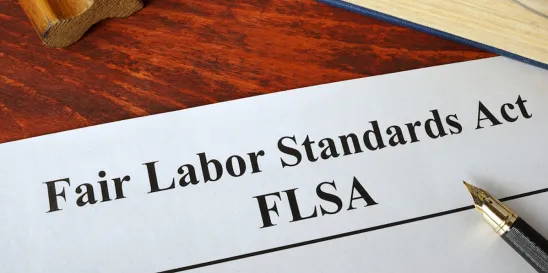What is the 8 and 80 overtime system?
The Fair Labor Standards Act (“FLSA”) generally requires covered employers to pay non-exempt employees overtime for all hours worked over 40 in a workweek. However, the FLSA provides an exception for certain employers in the healthcare industry, who are instead permitted to adopt a fixed work period of 14 consecutive days and pay overtime for all hours worked: (a) over 8 in a single day, or (b) over 80 in a 14-day work period.
Under the 8 and 80 overtime system, for example, an employee who works a 12-hour shift would be entitled to 4 hours of overtime pay. Similarly, an employee who works 92 hours during the 14-day work period would be entitled to 12 hours of overtime pay. Employers are permitted to credit premium pay for daily overtime toward the overtime compensation due for hours worked in excess of 80 for that period.
Which employers can use the 8 and 80 system?
Only employers “engaged in the operation of a hospital or an establishment…primarily engaged in the care of the sick, the aged, or the mentally ill or defective who reside on the premises” can use the 8 and 80 overtime system. 42 U.S.C. § 207(j).
Is the 8 and 80 system right for me?
The 8 and 80 system can offer employers more flexibility with staffing and could be financially beneficial. However, the best way to determine whether the 8 and 80 system is right for your organization is to “run the numbers” under a typical 40-hour workweek, as well as the 8 and 80 system, and compare the two.
Generally speaking, if your employees typically work 12-hour shifts, as many healthcare providers do, the 8 and 80 system may be more costly to use than a standard 40-hour workweek. For example, if employees typically work three 12-hour shifts or four 10-hour shifts in a week, they would not be entitled to overtime under a 40-hour workweek. Under the 8 and 80 system, however, the employees would be entitled to daily overtime for each of their shifts.
By contrast, if your employees always work 8-hour shifts, it may be beneficial to adopt an 8 and 80 system. For example, if employees work six 8-hour shifts during a week, they would be entitled to overtime under a 40-hour workweek. Under the 8 and 80 system, however, the employees would be entitled to overtime only if they worked more than 80 hours over the 14-day period (assuming no daily overtime).
Must I use the 8 and 80 system for all of my employees?
No. An employer can use both the standard 40-hour workweek and the 8 and 80 overtime system for different employees in the same workplace depending on business or operational needs. However, an employer cannot use both systems for a single individual employee.
How do I implement the 8 and 80 system?
To use the 8 and 80 system, an employer must have an agreement or understanding with affected employees before the work to which it is intended to apply is performed by the employee. While the FLSA does not require that such agreement or understanding be in writing, the best practice would be to enter into a written agreement with affected employees to avoid any discrepancies should the employee or the Department of Labor ever challenge the employer’s overtime practices.
If an employer chooses not to enter into a written agreement, the FLSA regulations still require employers to prepare a memorandum summarizing the terms of the 8 and 80 system, the date the oral agreement or understanding with the employee was entered into, and how long the agreement or understanding remains in effect.
What work period do I use?
An employer’s work period under the 8 and 80 overtime system must be a fixed and regularly recurring 14-day work period. The 14-day period may begin at any hour of any day of the week, and it need not commence at the beginning of a calendar day. It consists of 14 consecutive 24-hour periods, at the end of which a new 14-day work period begins.
Like a standard 40-hour workweek, the 14-day work period may be changed if the change is designed to be permanent and not to evade the overtime requirements. If an employer changes the work period permanently, it must calculate wages on both the old work period and the new work period and pay the amount that is more advantageous to each employee in the work period when the change occurs. Given the risks associated with changing work periods, employers should proceed with caution and in consultation with legal counsel when doing so.
What if I want to stop using the 8 and 80 system?
Employers are free to discontinue using the 8 and 80 system at any time on a going forward basis. When discontinuing the 8 and 80 system, employers should keep in mind the rules around calculating wages when changing work periods as discussed above.
What about state law?
Employers should consult with legal counsel to determine whether there are any laws or requirements that differ from the FLSA in all jurisdictions (state and local) in which they operate nationwide.




 />i
/>i
